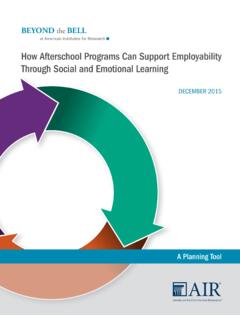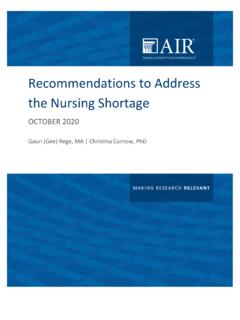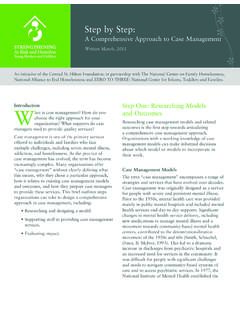Transcription of Cognitive Training for Older Adults: What Is It and Does ...
1 AMERICAN INSTITUTES FOR RESEARCH | MAKING RESEARCH RELEVANTI ssueBriefOCTOBER 2014 Cognitive Training for Older Adults: What Is It and Does It Work?Alexandra Kueider, Krystal Bichay, and George RebokOlder adults are more likely to fear losing their mental abilities than their physical But a growing body of research suggests that, for most people, mental decline isn t inevitable and may even be reversible. It is now becoming clear that Cognitive health and dementia prevention must be lifelong pursuits, and the new approaches springing from a better understanding of the risk factors for Cognitive impairment are far more promising than current drug points from our analysis of the current evidence include the following: Cognitive Training can improve Cognitive abilities. Dementia drugs cannot. No single Cognitive Training program stands out as superior to others, but a group format based on multiple Cognitive strategies seems the most promising.
2 Research comparing Cognitive exercise approaches is still thin. Rigorous evaluation stan-dards are needed. Cognitive Training could reduce health care costs by helping Older individuals maintain a healthy and active lifestyle. No scientific evidence exists that Cognitive train-ing can prevent Alzheimer s disease (AD) or other forms of dementia or predementia, and more research is needed before firm conclusions can be Is Known About Cognitive Training Now?Aggressive marketing notwithstanding, drugs mar-keted for dementias such as AD do little to maintain Cognitive and functional abilities or slow the prog-ress of the disease. In contrast to drugs are mental exercises to improve Cognitive abilities. Dr. Richard Suzman, Director of the Division of Behavioral and Social Research at the National Institute on Aging (NIA), states, These sorts of interventions are poten-tially enormously important.
3 The effects [of cogni-tive Training interventions] were substantial. There isn t a drug that will do that yet, and if there were, it would probably have to be administered with mental exercises. 2 Controversy and confusion still surround the efficacy of Cognitive Training in Older adults. A common mis-conception is that loss of Cognitive abilities mem-ory, attention, and the other faculties that enable one to think clearly, maintain social relationships, recover from disease, and cope with normal age-related decline is inevitable and unalterable as we age. But human and animal studies suggest that the brain 2 ISSUE BRIEFis malleable, even late in life. Although no conclusive evidence points to any particular Cognitive train-ing program as the most effective way to maintain current Cognitive abilities or delay dementia s onset, participation in mentally stimulating activities is associated with lowered risk for developing AD and related dementias.
4 There is an urgent need to lower the risk of develop-ing AD and related dementias quickly, effectively, and at a low cost. According to the NIA, 87 percent of individuals remain cognitively healthy well into old age, while one in seven develop more severe cogni-tive impairments, including One in nine adults over the age of 65 has AD, and one in three over the age of 85 has And the aging population is growing rapidly. In 2010, 40 million people aged 65 and Older accounted for 13 percent of the total population. In 2030, the number of people in the United States over the age of 65 is expected to grow to 72 million, accounting for almost 20 percent of the Is Cognition, and What Is Cognitive Training ?Cognition is a combination of processes, including paying attention, learning and reacting to objects in the environment, and using language and memory. If cognition becomes impaired, an individual may have difficulty performing everyday tasks.
5 If those tasks become very hard or impossible to perform, AD or another type of dementia is diagnosed, in which case Cognitive Training may be in order. The key question here is whether Training basic Cognitive abilities will transfer to everyday abilities, such as managing one s finances or medicines. Cognitive Training is based on the idea that the brain, even in old age, can change for the better. What we know about the brain suggests that it resembles muscles: In the same way that physical Training improves physical abilities, Cognitive Training (or brain Training ) improves Cognitive (or mental) abili-ties. Cognitive Training uses guided practice on a set of tasks related to memory, attention, or other brain functions. This Training can take many shapes. For instance, it can be conducted on the computer or delivered in person, either individually or in small groups. But it typically involves using repetitive exercises designed to improve single ( , memory) or multiple ( , memory and reasoning) Cognitive abilities.
6 Cognitive Training programs seem more likely to work if they are delivered in a group format, contain multiple Cognitive strategies ( , the use of imagery to aid memory and repetition), and grow more chal-lenging as performance Table 1 compares some Cognitive Training programs to Cognitive stimu-lation and Cognitive rehabilitation, all of which aim to increase general Cognitive and social 1. Three Approaches to Improve Cognitive Abilities Cognitive TrainingCognitive StimulationCognitive RehabilitationDescriptionUses repetitive exercises keyed to specific Cognitive abilities. May be computer-as-sisted or delivered in person individually or in small with activities involving some mental processing in a social context. Aims to be enjoyable. Tailored to the individual and involves working on personal goals, often using ex-ternal Cognitive aids. Usually implemented in real-world 1 The ACTIVE study trained one of three abilities: Memory ReasoningInformation processing speed7 Experience Corps uses the time, skills, and experience of Older adult volunteers to improve the health and well-being of the volunteers and the educational outcomes of disadvantaged elementary-school children.
7 Volunteers are trained for 30 hours in literacy support, violence prevention and other personalized memory notebook system, much like a Daytimer, is tailored to an individual s memory deficits. Sections may include: Orientation (personal and medical info)Names of emergency contactsExample 2 The IMPACT study used six computerized exercises to improve the speed and accu-racy of auditory information Odyssey is a community-based intervention: Older adults tackle a program of problem solving and brain teasers. Teams meet weekly for 16 weeks to de-velop and test solutions for a long-term problem and to practice working as a group on spontaneous may also cover specific everyday tasks, such as making change or balancing a BRIEFT hroughout the past 15 years, Cognitive Training interventions have been used to improve Cognitive performance in healthy Older adults. To date, the largest trial of Cognitive Training in cognitively healthy Older adults is the Advanced Cognitive Training for Independent and Vital Elderly (ACTIVE) study.
8 Its participants were assigned to one of three interven-tion groups ( , memory, reasoning or information processing speed) or to a no-contact control group. The memory Training intervention aimed to cre-ate multiple ways to make the to-be-remembered information more meaningful, such as remembering it by categorizing, visualizing and associating it with something familiar or well-known. The reasoning Training intervention aimed to improve the ability to identify patterns from a series of letters, numbers and words that act as an aid to organizing daily activities, such as following a medication regimen and thus reducing the burden on memory. (If one knows how to read a bus schedule, one doesn t have to remember when the bus comes.) The information processing speed Training intervention aimed to improve mental processing speed so that increasingly complex information could be under-stood increasingly fast.
9 How quickly could someone, for instance, identify whether an object in the middle of their visual field was a car or a truck while simul-taneously noting where in their peripheral field of vision another car was located. Results from the ACTIVE study showed that Training had immediate and long-term effects lasting up to five years on memory abilities11 and up to 10 years on reasoning and information processing speed,12 far longer, in both cases, than what is documented for other programs. Training also had real-world effects. Ten years after initial Training , all three train-ing groups reported less difficulty in the instrumen-tal activities of daily living ( , medication man-agement, meal preparation) than the control group, and at least 60 percent of participants in all trained groups continued to report less difficulty perform-ing such activities after 10 years, compared to 49 percent of nontrained participants.
10 After 10 years, 60 to 70 percent of participants said that they were as good as or better than when they started the ACTIVE study. [ACTIVE] found that community-dwelling seniors who received Cognitive Training had less of a decline in certain thinking skills than [those] who did not have Training . The study addresses a very important hypothesis interventions can be designed to maintain Cognitive function. - Richard J. Hodes, , NIA DirectorCan the Training effects of ACTIVE and other cog-nitive Training trials be compared to the treatment effects of drug trials with dementia patients? The short answer is that it s difficult. Both the primary outcome measures used in these studies and the approach to quantifying treatment differ from those used in drug trials. Even more important, the partici-pants differ. All ACTIVE participants were healthy el-derly whose Cognitive trajectory was assumed to be relatively stable over the study period, whereas AD drug study participants are amid progressive brain degeneration so their Cognitive skills are on a steep downhill trajectory, such that even 6 to 12 months makes a big difference in their Cognitive abilities.











